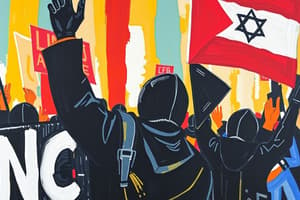Podcast
Questions and Answers
What actions did the Sandesh Farmar Morcha (SFM) take to support protestors against the farm laws?
What actions did the Sandesh Farmar Morcha (SFM) take to support protestors against the farm laws?
- They published a newsletter promoting the laws.
- They formed social media groups on platforms. (correct)
- They organized physical protests nationwide.
- They held meetings with government officials.
Which law was cited as the basis for banning online activities by the government?
Which law was cited as the basis for banning online activities by the government?
- Civil Rights Act
- Indian Penal Code
- Constitutional Amendment Act
- Information Technology Act (correct)
What was the outcome of the anticipatory bail applications filed by the members of SFM?
What was the outcome of the anticipatory bail applications filed by the members of SFM?
- They chose not to file for bail.
- The bail applications were dismissed by a local court.
- They were granted bail.
- Their applications were rejected by the High Court. (correct)
What sections of the Indika Penal Code were the members of SFM charged with?
What sections of the Indika Penal Code were the members of SFM charged with?
How did the government respond to the unrest caused by the SFM's social media posts?
How did the government respond to the unrest caused by the SFM's social media posts?
What was the primary argument made by the Sandesh Farmar Morcha regarding the government actions?
What was the primary argument made by the Sandesh Farmar Morcha regarding the government actions?
Which platforms were used by the SFM for communication?
Which platforms were used by the SFM for communication?
What triggered the urgent cabinet meeting in the Union of Indika?
What triggered the urgent cabinet meeting in the Union of Indika?
What fundamental rights were the members of SFM concerned about being violated by the government's actions?
What fundamental rights were the members of SFM concerned about being violated by the government's actions?
What role did social media play in the unrest that occurred in the Union of Indika?
What role did social media play in the unrest that occurred in the Union of Indika?
How did the government justify the monitoring and decryption of information under the Information Technology Act?
How did the government justify the monitoring and decryption of information under the Information Technology Act?
What were the sections of the Indika Penal Code that the members of SFM were charged with intended to address?
What were the sections of the Indika Penal Code that the members of SFM were charged with intended to address?
In the context of the protest, what was the government's response to the SFM's claim about false information dissemination?
In the context of the protest, what was the government's response to the SFM's claim about false information dissemination?
What was the significance of the Writ petition filed by the SFM against the Home Ministry's order?
What was the significance of the Writ petition filed by the SFM against the Home Ministry's order?
How did the rejection of anticipatory bail applications by the High Court affect the members of SFM?
How did the rejection of anticipatory bail applications by the High Court affect the members of SFM?
What implications could the actions taken against SFM have on freedom of expression in the Union of Indika?
What implications could the actions taken against SFM have on freedom of expression in the Union of Indika?
Flashcards are hidden until you start studying
Study Notes
Overview of the Situation in Indika
- Indika is a democratic country currently facing protests against certain farm laws.
- The Sandesh Farmar Morcha (SFM) is a significant association supporting the protesting farmers.
Role of Sandesh Farmar Morcha (SFM)
- SFM utilizes a vast network across the country to organize and aid protests.
- The association created social media groups on platforms like Wazzapp and Friendsbook to disseminate information and mobilize support.
Impact of Social Media Posts
- SFM's members expressed critical views on the constitutional validity of the farm laws through social media.
- This led to widespread agitation and riots throughout the country, escalating tensions with the government.
Government Response
- Posts by SFM reached government officials, prompting an urgent cabinet meeting.
- A resolution was passed to ban specific online activities under the Information Technology Act regarding monitoring and decryption of information.
Legal Actions Taken
- Members of SFM were arrested for allegedly spreading false information intended to instigate public unrest.
- Authorities seized members' devices (phones, computers, laptops) for investigation purposes.
Surveillance Measures
- The government empowered its security and intelligence agencies to intercept, monitor, and decrypt information from computer resources.
Charges Against the Members
- SFM members faced charges under sections 120B (criminal conspiracy), 124A (sedition), and 153A (promoting enmity) of the Indika Penal Code.
- Their applications for anticipatory bail were denied by the High Court.
Legal Proceedings by SFM
- SFM argued that these actions constitute a violation of fundamental rights and the right to privacy.
- The association filed a writ petition challenging:
- The validity of the Home Ministry’s orders.
- The constitutional validity of section 124A of the Indika Penal Code.
- The denial of bail applications in the Supreme Court of Indika.
Potential Implications
- The case raises significant questions about the balance between civil liberties and governmental authority during public dissent.
- Legislative and judicial scrutiny of sedition laws and their application in democratic societies may follow.
Overview of the Situation
- Indika is a democratic country facing protests against recently passed farm laws.
- Sandesh Farmar Morcha (SFM) emerged to support the protestors, leveraging its extensive national network.
Social Media's Role
- SFM created groups on platforms like Wazzapp and Friendsbook to organize and boost protest visibility.
- Members expressed critical views on the farm laws, leading to nationwide agitation and riots.
Government Response
- The ruling party, alerted by public reactions to SFM's social media posts, convened an urgent cabinet meeting.
- A resolution was passed to ban online activities deemed harmful, authorized by the Information Technology Act regarding Monitoring and Decryption of Information.
Legal Actions Taken
- Several SFM members were arrested for allegedly spreading false information to incite public unrest.
- Authorities seized personal devices from the arrested members as part of the investigation process.
Legal Charges
- Arrested members faced charges under sections 120B (criminal conspiracy), 124A (sedition), and 153A (promoting enmity) of the Indika Penal Code.
- Anticipatory bail applications for these members were denied by the High Court, leading to further legal challenges.
Fundamental Rights Violation Claims
- SFM argued that the government’s actions constitute a violation of fundamental rights and the right to privacy.
- The association filed a writ petition contesting:
- The legality of the Home Ministry's order.
- The constitutional validity of section 124A of the Indika Penal Code.
- The High Court's bail rejection decision.
Contextual Legal Framework
- The Constitution of Indika is aligned with the Constitution and laws in force in India, serving as a legal reference point for the arguments presented.
Studying That Suits You
Use AI to generate personalized quizzes and flashcards to suit your learning preferences.




